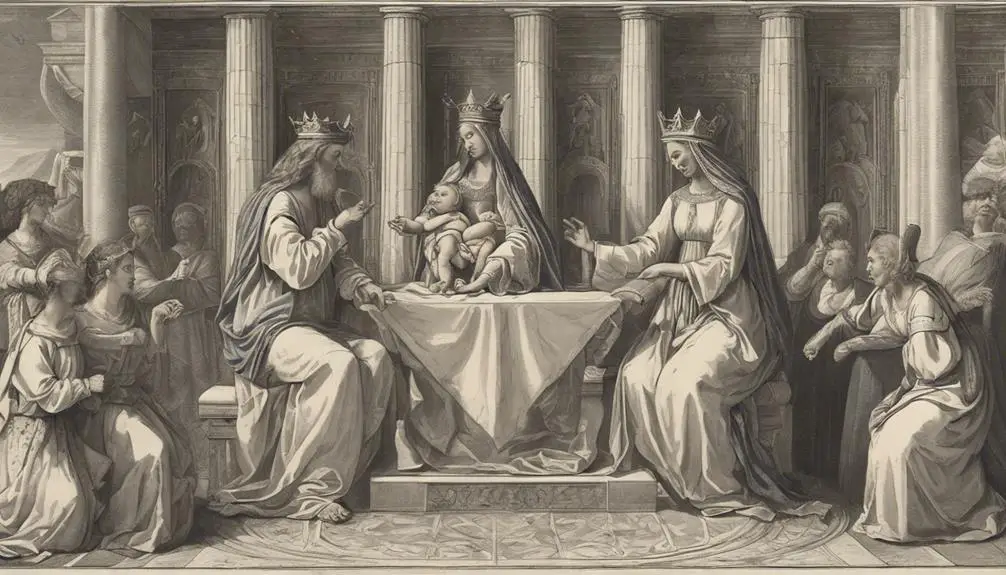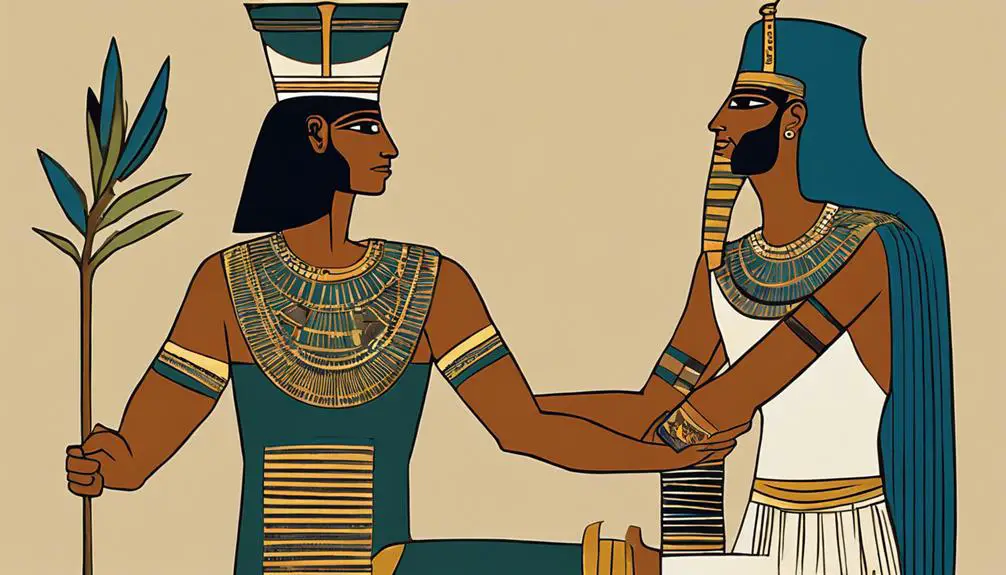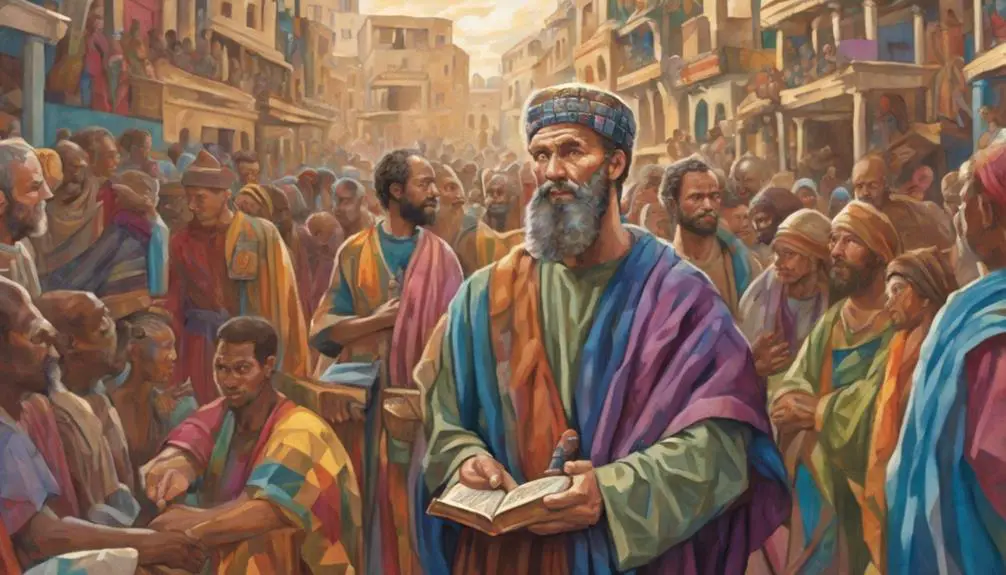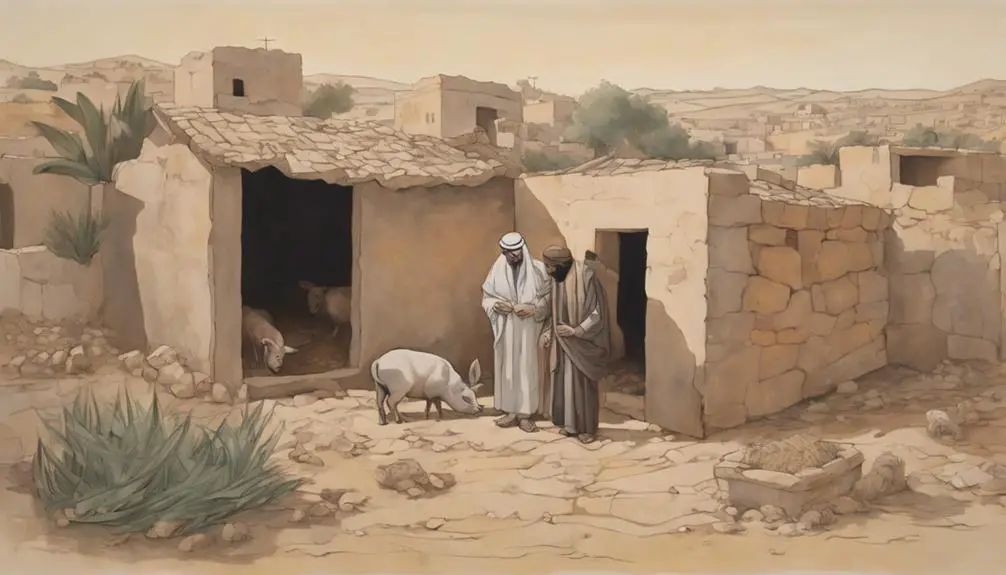Witness how biblical figures like Abraham, Solomon, and Joseph master the art of compromise in unexpected ways; explore their timeless wisdom today.

Examples of Compromise in the Bible
Just as a ship must adjust its sails to navigate changing winds, you'll find that many biblical figures wisely used compromise to navigate their circumstances. Consider Abraham and Lot dividing land peacefully, Solomon's judicious baby-splitting proposal, or Joseph's forgiveness of his brothers.
Even Paul adapted his message to suit different cultures, and Jesus' parable of the prodigal son signifies a profound acceptance. Aren't you intrigued to explore how each of these examples embodies a valuable lesson in finding middle ground?
Let's dive deeper into these biblical narratives and their enduring wisdom.
Key Takeaways
- The Bible presents numerous examples of compromise, such as Abraham and Lot's land agreement, which underscores peaceful conflict resolution.
- Stories like Joseph's forgiveness of his brothers and Jesus's parable of the Prodigal Son demonstrate how compromise can lead to forgiveness and reconciliation.
- Paul's adaptation to different cultures exhibits the importance of cultural diplomacy and adaptability in the Bible.
- Both Solomon's wise judgment and the Parable of the Prodigal Son highlight the significance of divine wisdom in conflict resolution.
Abraham and Lot's Land Agreement

In exploring the theme of compromise in the Bible, you'll find the first significant instance in the agreement between Abraham and Lot over land, a story that offers profound insights into peaceful resolution of conflicts. This narrative, set within the context of Land Division Disputes, showcases Abraham's Diplomacy as a shining example of peaceful negotiation.
The dispute arose when Abraham's and Lot's herdsmen couldn't share the land due to its inability to support their combined livestock. Rather than letting the situation escalate, Abraham proposed a solution: a division of the land. He let Lot choose first, a move that demonstrated not only wisdom but also humility.
Abraham's diplomacy in this situation presents a compelling model for resolving Land Division Disputes. His decision to allow Lot to choose the land first shows his commitment to maintaining peace and familial harmony, even at the potential cost of his own interests. This act of selflessness reveals a deep understanding of compromise as a tool for conflict resolution.
In essence, Abraham's actions set a precedent for how disputes over resources should be tackled, highlighting the importance of compromise, humility, and diplomacy in achieving peaceful resolutions. This story is an important reminder of the power of compromise in resolving disputes and maintaining harmony.
Solomon's Wise Judgment

Delving deeper into the theme of compromise in the Bible, you'll encounter the renowned story of Solomon's wise judgment, a narrative that underscores the value of discernment and fairness in conflict resolution. This biblical account, found in 1 Kings 3:16-28, reflects Solomon's diplomacy and the manifestation of Divine wisdom.
Two women, living in the same house and each having an infant son, came before King Solomon with a dispute. Both claimed to be the mother of the same child. Solomon's response was an unusual proposal: to divide the living child in two, giving each woman half. This extreme measure, although seemingly cruel, was a clever ploy to deduce the true mother. The real mother's love for her son made her willing to give him up to save his life, thus revealing her identity to Solomon.
Through this incident, Solomon demonstrated a profound understanding of human nature and a unique approach to conflict resolution. He also displayed an extraordinary ability to make fair judgments even under complex circumstances. The story of Solomon's wise judgment underscores the importance of compromise, discernment, and the wise use of authority. It also affirms the significance of Divine wisdom in resolving conflicts.
Joseph's Forgiveness of His Brothers

Turning to the story of Joseph's forgiveness of his brothers, we find another compelling illustration of compromise in the Bible. Here, sibling rivalry is integral to the narrative. Joseph, favored by his father and gifted with dream interpretation, incites jealousy among his brothers, leading to his sale into Egyptian slavery.
Joseph's dreams weren't mere figments of his imagination; they were prophetic. His ability to interpret dreams eventually led to his ascent to a position of power in Egypt. Yet, instead of harboring resentment against his brothers, Joseph chose forgiveness. This decision was a significant compromise–a choice to let go of past hurts for the sake of family unity.
When famine struck, Joseph's brothers came to Egypt seeking aid, unknowingly from the brother they'd wronged. Joseph could've sought revenge; instead, he forgave them. He even used his authority to ensure their survival. This act of forgiveness wasn't just a personal triumph, but a biblical example of compromise.
Joseph's story underscores the value of compromise, even in the face of profound personal injury. It serves as a potent reminder that the spirit of compromise can bring about reconciliation, healing, and ultimately, redemption.
Paul's Adaptation to Different Cultures

Moving from the Old Testament to the New Testament, you'll encounter the Apostle Paul, a figure who embodied the spirit of compromise by adeptly adapting to various cultures in his missionary work. This adaptation wasn't a form of surrender, but rather a form of cultural diplomacy. Paul's flexibility allowed him to resonate with diverse audiences, bridging cultural gaps to spread the gospel.
Understand that Paul was a scholar of both Jewish and Roman law, making him uniquely qualified to converse intelligently with both cultures. He was capable of contextualizing the gospel message in ways that were culturally sensitive and relevant. In Acts 17, for instance, Paul intelligently engaged with Greek philosophers in Athens, using their own altar inscription to a 'Unknown God' as a starting point to discuss Christ.
Paul's approach wasn't one of domination or assimilation, but of understanding and compromise. He didn't demand that cultures conform to his perspective, but adapted his message to meet them where they were. This is a shining example of cultural diplomacy in the Bible and a testament to the importance of flexibility in religious discourse. Paul's adaptability remains a compelling model for us today.
Jesus's Parable of the Prodigal Son

In the heart of Jesus's teachings, you'll find the Parable of the Prodigal Son, a story steeped in compromise and forgiveness that offers profound insights into the nature of divine love and mercy. This parable reveals the Prodigal Son's repentance and his Father's unconditional love, representing a significant compromise.
The Prodigal Son, in his recklessness, squanders his inheritance. However, upon realizing his mistake, he repents and returns home. His Father, instead of punishing him, welcomes him back with open arms. This exemplifies the Father's unconditional love.
Here's a concise table summarizing these key points:
Prodigal Son's Actions |
Father's Response |
|---|---|
Squanders Inheritance |
Unconditional Love |
Repentance |
Forgiveness |
Returns Home |
Celebration |
This table helps illustrate the compromise in the Parable. The Father could've rejected the Son for his reckless behavior, but instead he forgives him, showing his limitless love. On the other hand, the Son could've stayed away, ashamed of his mistakes, but he decides to repent and return home. This compromise shows us the power and depth of divine mercy and love.
Frequently Asked Questions
What Other Instances Are There in the Bible Where Compromise Is Not Related to Land Disputes or Familial Issues?"
You'll find compromising situations unrelated to land or family disputes in the realm of prophecy and ethics in the Bible. Consider Jonah's story: he initially rejects God's command to prophesy Nineveh's destruction, but later compromises and fulfills his duty.
In terms of ethics, Daniel's decision to uphold his dietary laws in Babylonian captivity shows a negotiated compromise between personal conviction and societal demands. These examples highlight the universality of compromise in various Biblical contexts.
How Does the Concept of Compromise in the Bible Relate to Modern Christian Teachings and Practices?"
You'll find that modern Christian teachings often draw from biblical examples of compromise, especially those found in parables. These stories stress the importance of balance, negotiation, and sacrifice in problem-solving.
Understanding the consequences of biblical compromise provides Christians with guidance on how to handle moral dilemmas in today's world. It's a key aspect of upholding Christian values while navigating contemporary societal challenges.
Can You Provide Examples of Compromise in the New Testament That Are Not Directly Related to the Teachings of Jesus or Paul?"
You're asking for New Testament examples of compromise, excluding Jesus or Paul's teachings.
Consider the Apostles' diplomacy in Acts 15, where they resolved the Gentile circumcision dispute.
Or, reflect on the compromise in Revelation 2:20; tolerating Jezebel's teachings was a compromise of the church in Thyatira.
These instances demonstrate how early Christian communities navigated disagreements, striking a balance between maintaining faith and accommodating diverse beliefs.
Are There Any Instances of Compromise in the Bible That Led to Negative Outcomes?"
Yes, there are instances of compromise in the Bible that led to negative outcomes. One notable example is Judas Iscariot's betrayal of Jesus. Judas made a sacrificial compromise, exchanging his loyalty for thirty pieces of silver.
This biblical betrayal resulted in severe guilt and regret, ultimately leading to his demise. Therefore, this instance demonstrates how certain compromises can lead to disastrous consequences.
How Does the Bible's Interpretation of Compromise Differ From the Secular Understanding of Compromise?"
In the Bible, compromise isn't seen as it is in a secular context. It's not about finding middle ground, but staying true to divine principles.
When you compare secular vs divine compromise, the Bible emphasizes adherence to the word of God. To the Bible, compromise can lead to spiritual downfall.
Conclusion
In conclusion, the Bible's narratives offer profound instances of compromise. From Abraham and Lot's land division to Solomon's clever verdict, compromise plays a vital role.
Joseph's forgiveness and Paul's cultural adaptation further illustrate this point. Even Jesus's parable of the Prodigal Son echoes the theme.
These biblical accounts remind us that compromise, while often challenging, is a crucial part of life, fostering understanding, reconciliation, and peace among different individuals and societies.



Sign up